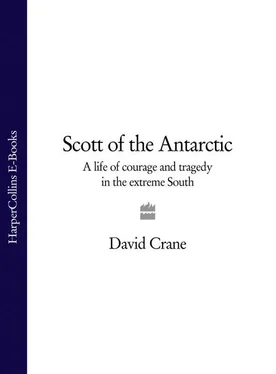1 ...8 9 10 12 13 14 ...17 There is nothing unusual in these juvenile maunderings, except perhaps that a young naval sub-lieutenant’s anxieties and ambitions should take so specifically literary a form. Of all the great explorers of the Heroic Age Scott was the only one – Nansen not excepted – who had the literary talent to make imaginative sense of his life, and if this early diary shows an almost embarrassing lack of promise it is fascinating that the same compulsion to give shape to his experience that filled his last hours should have equally exercised the young Scott.
There has never been a shortage of men of action who have wanted to be artists – General Wolfe famously declared that he would rather have written Gray’s ‘Elegy’ than take Quebec (which must have been a bit of a ‘facer’ to the men under his command) – but the man who is both is a rarer animal. The conditions of the First World War inevitably threw up a number of poets who were forced into the unfamiliar world of their natural opposites, but in the deeply philistine naval culture within which Scott was brought up – a culture suspicious of the intellectual life in any form – the rarity of such an ambition must have brought an acute sense of loneliness.
And it was not just his inability to express himself that troubled him, but a deeper malaise that hovers somewhere between adolescent mawkishness and the ‘black dog’ from which he never escaped. ‘It is only given to us cold slowly wrought natures to feel this drear deadly tightening at the heart,’ the diary continues after a half-page has been ripped out, ‘this slow sickness that holds one for weeks. How can I bear it. I write of the future; of the hopes of being more worthy; but shall I ever be – can I alone, poor weak wretch that I am, bear up against it all. The daily round, the petty annoyances, the ill-health, the sickness of heart – how can one fight against it all. No one will ever see these words, therefore I may freely write – what does it all mean?’
If it seems impossible now to know what – if anything specific – lay behind this passage, its tone inevitably draws attention to the one period of Scott’s naval life over which there is any uncertainty. A lot has been made of a brief gap in his service record while he was on the Pacific Station, and while there is not a shred of evidence to suggest he had put up any sort of ‘black’ that was later covered up, it does seem likely that Scott was ill on the Station’s depot ship, Liffey , at Coquimbo for a few weeks in the autumn of 1889. *
The only professional risk Scott ever ran, however, was not that he would be a bad naval officer, but that he would turn himself into only too good a one, and whatever lay behind the diary entry never surfaced in his work. He had been lent by Hulton to Caroline and then Daphne shortly after they had arrived at Esquimault in British Columbia, and an independent account of Scott’s journey back from Acapulco in the City of New York to rejoin his ship hardly suggests anything like a physical or mental crisis. ‘In the late winter a quarter of a century ago,’ Sir Courtauld Thomson later wrote in a letter that Barrie wove into his legend of the Young Scott, Scott himself always looked back with particular fondness to his time on the Pacific Station, and he made friends there that he would keep all his life. In professional terms Esquimault was possibly the least interesting of all the navy’s global stations, but if the dress code spelled out in Standing Orders is anything to go by – Helmets to be worn with White Undress; Frock coats to be buttoned close up; Undress Coats with Epaulettes, Gold Laced Trousers and White Waistcoats for Balls; Mess Jackets for Dinner; Dress, White or Blue for Dinner; Undress, Dark Coats and Hats for Sundays ashore – there were all the social compensations of naval life at the apogee of British seapower.
I had to find my way from San Francisco to Alaska. The railway was snowed up and the only available transport at the moment was an ill-found tramp steamer. My fellow passengers were mostly Californians hurrying off to a new mining camp and, with the crew, looked a very unpleasant lot of ruffians. Three singularly unprepossessing Frisco toughs joined me in my cabin, which was none too large for a single person. I was then told that yet another had somehow to be wedged in. While I was wondering if he could be a more ill-favoured or dirtier specimen of humanity than the others the last comer suddenly appeared – the jolliest and breeziest English naval Second Lieutenant. It was Con Scott. I had never seen him before, but we at once became friends and remained so till the end. He was going up to join his ship which, I think, was the Amphion, at Esquimault, B.C.
As soon as we got outside the Golden Gates we ran into a full gale which lasted all the way to Victoria, B.C. The ship was so overcrowded that a large number of women and children were allowed to sleep on the floor of the only saloon there was on condition that they got up early, so that the rest of the passengers could come in for breakfast and the other meals.
I need scarcely say that owing to the heavy weather hardly a woman was able to get up, and the saloon was soon in an indescribable condition. Practically no attempt was made to serve meals, and the few so-called stewards were themselves mostly out of action from drink or sea-sickness.
Nearly all the male passengers who were able to be about spent their time drinking and quarrelling. The deck cargo and some of our top hamper were washed away and the cabins got their share of the waves that were washing the deck.
Then it was I first knew that Con Scott was no ordinary human being. Though at that time still only a boy he practically took command of the passengers and was at once accepted by them as their Boss during the rest of the trip. With a small body of volunteers he led an attack on the saloon – dressed the mothers, washed the children, fed the babies, swabbed down the floors and nursed the sick, and performed every imaginable service for all hands. On deck he settled the quarrels and established order either by his personality, or, if necessary, by his fists. Practically by day and night he worked for the common good, never sparing himself, and with his infectious smile gradually made us all feel the whole thing was jolly good fun.
I daresay there are still some of the passengers like myself who, after a quarter of a century, have imprinted on their minds the vision of this fair-haired English sailor boy with the laughing blue eyes, who at that early age knew how to sacrifice himself for the welfare and happiness of others.
Such a life came at a cost, of course, and a lieutenant’s pay of £182.10S a year can only have been just enough to keep up those appearances about which Scott was always morbidly sensitive. In his future years he would have to watch every wardroom drink he bought and pass over every entertainment that had to be paid for, but at Esquimault at least he seems to have been able to hold his own in a society eager to embrace an engaging and attractive young naval officer. He rode, canoed, dined out, and in the handsome Victoria home of Peter O’Reilly, a prominent figure in local life, and his wife, found a welcome that helped ease his homesickness. For many years after Scott kept up a fitful but affectionate correspondence with Mrs O’Reilly and her daughter Kathleen, and in 1899, on the eve of his new life in polar exploration, was still writing of ‘ever fresh memories of good times’ at Esquimault.
There was never a suggestion at the time, however, or in any of the subsequent correspondence, of a warmer friendship with Kathleen, and Scott was just one of any number of officers who washed through the O’Reillys’ hospitable home. ‘Warrender & Scott called,’ Peter O’Reilly noted in his journal for 4 May, six weeks after Scott’s return to Amphion . ‘Warrender & Scott called,’ he wrote again three weeks later; ‘Warrender & Scott arrived in their canoe’; ‘Scott called’; ‘Scott came to supper’; ‘Scott dined with us’; ‘Scott supper’; ‘Scott accompanied the Admiral to church & returned to supper’; ‘Kit: Warrender & Scott on horseback.’ ‘How lovely it must be at Victoria now,’ Scott wrote to Mrs O’Reilly on his return to England and the summer rain of Devon the following year. ‘I can imagine the delightful weather even in the midst of all the rain we are forced to endure here. What jolly times those were for me at Victoria! If anything were needed to recall them to memory – which nothing is – the strawberries and cream on which I chiefly keep my spirits up at present would be a constant reminder … I often feel I shall never have such times again as those days at Victoria which were so very pleasant thanks to your invariable kindness.’
Читать дальше












![John Bruce - The Lettsomian Lectures on Diseases and Disorders of the Heart and Arteries in Middle and Advanced Life [1900-1901]](/books/749387/john-bruce-the-lettsomian-lectures-on-diseases-and-disorders-of-the-heart-and-arteries-in-middle-and-advanced-life-1900-1901-thumb.webp)